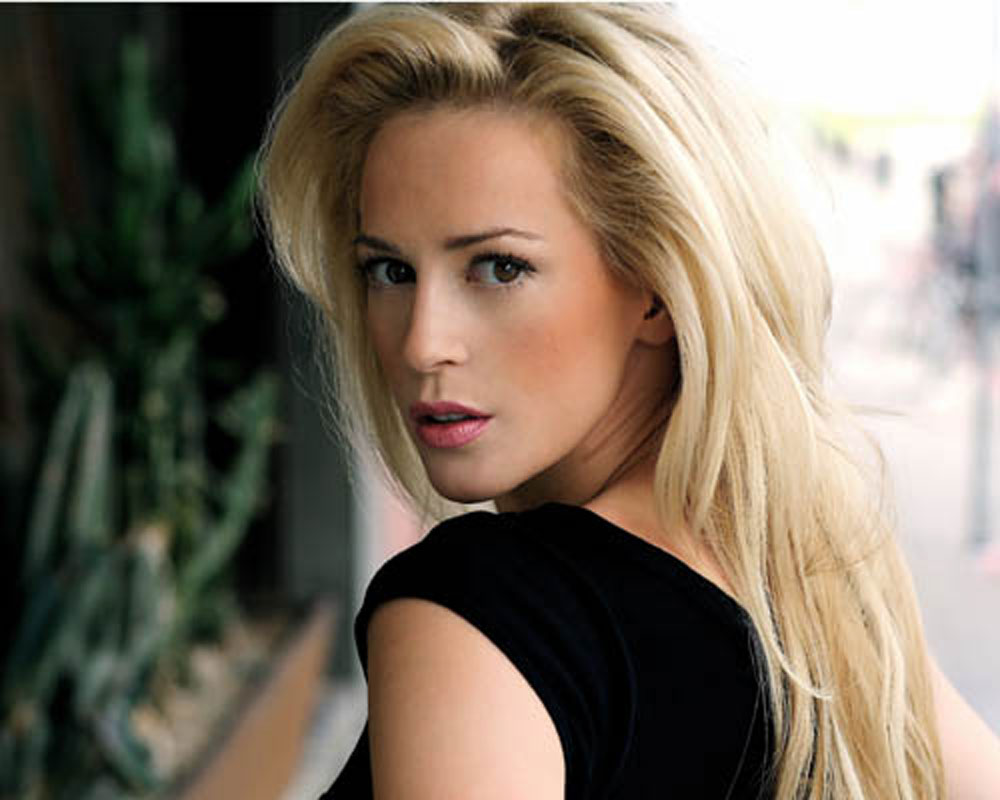SCOTS actress Louise Linton faces a backlash over claims in a book that she almost died at the hands of African rebels.
Edinburgh-born Linton – who has appeared in films alongside Tom Cruise and Robert Redford – published a memoir of her gap year in “darkest Africa” earlier this year.
But the actress has been widely ridiculed on social media with some critics claiming her dramatic story does not add up.
They claim there is little or no evidence of insurgent activity in Zambia in 1999, when Linton was there.
The book, In Congo’s Shadow, is billed as “the inspiring memoir of an intrepid teenager who abandoned her privileged life in Scotland”.
It is further claim to be “a tale of lost innocence and one daring young girl’s bittersweet journey to the heart of Africa”.

The 290-page book contains a passage where “armed rebels descended” on her village – entering the country from neighbouring Congo.
According to her book Linton was forced to hide from the rebels for fear of being murdered or raped.
But Zambians and UK readers alike have taken to social media to claim there are inaccuracies in her story – and are accusing her of having a “white saviour complex”.
Many are claiming that there were no such raids in the areas at the time. One said that his 60 year-old step-mother – who has lived in the country since the age of 18 – has “never heard” of any such rebels.
Among those making the claims another is one man who says he owns a fishing lodge near the one Linton volunteered at.
He says Congolese soldiers did arrive at one point – in a different area to where Linton was staying – but that they were “tired, hungry and thirsty”, and had come to surrender.
Gerard Zytkow wrote: “I know all of this because I was there.
“Shame on her for her mind boggling and nonsensical fiction. Her book should be banned. Or at least be presented as warped fiction.”
Quoting Linton, one other Twitter user wrote: “‘The dense jungle canopy above me?’ Zambia has savanna grasslands, not dense jungle. But I guess ‘English girl experience’.
Others have pointed out that there are no “12 inch spiders” in the country as per her claims, and some have pointed out that Linton writes about the monsoon season – which Zambia does not have.
Others put a more humourous spin on her claims.
Muchemwa Sichone wrote: “The only thing missing from the Louise Linton story is Tarzan and Mowgli.”
Luse Fiasco posted an image of a white doll carrying a black child in front of a jungle hut.
She captioned it: “Dodging rebels and wildlife close calls in Africa’s darkest jungles of Zambia.”

In the piece published online last week Linton describes her apparent ordeal in Zambia: “Gunshots echoed through the bush and seemed to be getting closer.
“I couldn’t imagine the awful, sporadic acts of violence that were being committed as the village was ransacked. Fear and anger for the children consumed my thoughts. Part of me wanted to jump up and make it all stop, but then I heard shrill screams and shrank back into my hiding place.
As the night ticked interminably by, I tried not to think what the rebels would do to the ‘skinny white muzungu with long angel hair’ if they found me.
“Clenching my jaw to stop my teeth chattering, I squeezed my eyes shut and reminded myself how I’d come to be a central character in this horror story.”
The book containing the passage has also been greeted with scorn on Amazon – where it currently has 58 one star reviews, with just two five star reviews.
Among them one writes: “Would be funny if it wasn’t so horrifyingly patronising and untrue. The Zambia she describes has simply never existed.
“There have never been machete-wielding armed militia in Lusaka, the Hutu-Tutsi conflict never spilled over into Zambia, there are no 12-inch rain spiders, there is no jungle. This woman is…trying to cash in on the western world’s ridiculously narrow view of Africa, with evidently no qualms about slandering an entire country.”
Another added: “This book is total fiction, these events never happened in Zambia, at either Ndole Bay or Kasaba Bay in Lake Tanganika, I know the owners of both these lodges – and they took Louise in as a gap student.
A woman, who asked not to be named, said she worked at one of the “luxury” lodges at the same time as Linton.
She said: “Louise Hayward as I knew her worked at a luxury lodge called Kasaba bay on lake Tanganyika in the late 1990s about 1998/99.
“She was a gap student out on her gap year a very confused young lady. The incidents she talks about NEVER occurred and even if they had she wouldn’t have seen them as she was at our lodge across the water.
“Louise never lived in a village she lived in luxury in one of our chalets. The photos…of her with local Zambian children were the families of our staff and game scouts.
“I can name some of the ladies if needs be but I really don’t want to go into print.
“Eventually we had to release her from completing her time with us early as she caused quite a few problems and she wasn’t happy here. We had to get clearance for the company she came out with before we could release her to travel back to UK.”
Mr Zytkow, who runs the Ndole Bay Lodge, said today: “The distortion of facts about the security in Zambia is what prompted me to comment and correct her story. This story was too close to home to ignore.

“Tourism struggles hugely in Africa with false stereotypes from rebels to Ebola and all the rest.
“I have spent most of my life living on the shores of Lake Tanganyika and we are the closest lodge to the DRC [Democratic Republic of Congo] border – 20kms away.
“Nothing like what she describes ever happened here.”
Mr Zytkow added that surrendering DRC troops crossed the border in the year she was there, but they did so peacefully.
He added: “I am based at Lake Tanganyika to this day and have yet to feel threatened by any situation, from DRC or elsewhere.”
The Edinburgh University Centre for African Studies later joined in the row, posting on Twitter: “Don’t be like Louise Linton. Come study at the Centre of African Studies.”
The parody account for “Zimba” – the HIV-infected child who apparently was inseparable from Linton – also continued to post.
On Tuesday at lunchtime it posted a message, saying: “Guys, please, enough. Spare my precious gap year saviour.”
Another satirical tweet showed a boy standing on a waterfall with the text: “The rebels blew up the main water pipe to the village in northern Zambia. Locals think it’s a waterfall.”
Yet another tweet “mocked up” a bottle of shampoo called “Linton angel hair” with the country of origin as “Made up in Zambia for rebellious hair”.
Linton has not yet commented directly on the claims but has apologised on Twitter for causing offence.
She wrote: “I am genuinely dismayed and very sorry to see that I have offended people as this was the very opposite of my intent.
“I wrote with the hope of conveying my deep humility, respect and appreciation for the people of Zambia as an 18yr old in 1999.
“I wrote about the country’s incredible beauty and my immense gratitude for the experiences I had there.”
Linton’s father, William Hay, today defended her account.
Mr Hay, who runs the Edinburgh-based family business, said: “As far as I can remember of what she said on her return that was the situation.
“The place was raided. I think the gamekeeper was shot dead.
“They trekked into the bush a bit and I got a phone call when she got to the nearest phone.”
Discussing the lodge and area Linton was staying, he said it was a “primitive hotel” which “was certainly not a sophisticated environment”.
He denied allegations that her book degrades Zambians by painting her as a “white saviour”, saying: “She had great respect for them.”
Mr Hay did, however, suggest that the manuscript of the book was changed by the publisher “and she was not happy with the story”.
He added: “She was really quite disappointed and quite embarrassed.”
